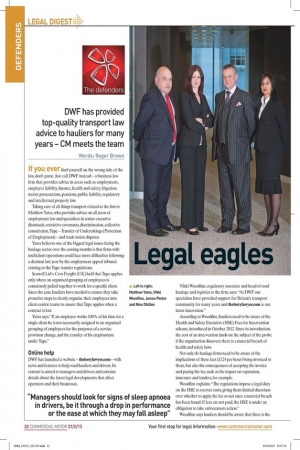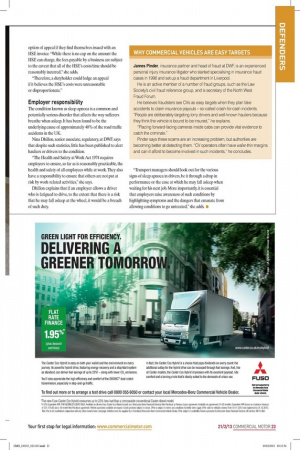DWF has provided top-quality transport law advice
Page 17

Page 18

If you've noticed an error in this article please click here to report it so we can fix it.
DWF has provided top-quality transport law advice to hauliers for many years - CM meets the team Words: Roger Brown If you ever find yourself on the wrong side of the law, don't panic. Just call DWF instead — a business law firm that provides advice in areas such as employment, employer liability, finance, health and safety, litigation, motor prosecutions, pensions, public liability, regulatory and intellectual property law.
Taking care of all things transport-related at the firm is Matthew Yates, who provides advice on all areas of employment law and specialises in senior executive dismissals, restrictive covenants, discrimination, collective consultation, Tupe — Transfer of Undertakings (Protection of Employment) — and trade union disputes.
Yates believes one of the biggest legal issues facing the haulage sector over the coming months is that firms with multiclient operations could face more difficulties following a decision last year by the employment appeal tribunal relating to the Tupe transfer regulations.
Seawell Ltd v Ceva Freight (UK) held that Tupe applies only where an organised grouping of employees is consciously pulled together to work for a specific client. A Left to right: Since the case, hauliers have needed to ensure they take Matthew Yates, Vikki proactive steps to clearly organise their employees into Woodfine, James Pinder client-centric teams to ensure that Tupe applies when a and Nina Dhillon contract is lost.
Yates says: "If an employee works 100% of his time for a single client he is not necessarily assigned to an organised grouping of employees for the purposes of a service provision change, and the transfer of his employment under Tupe."
Online help DWF has launched a website — thelorrylawyer.com — with news and features to help road hauliers and drivers. Its content is aimed at managers and drivers and contains details about the latest legal developments that affect operators and their businesses.
Vikki Woodfine, regulatory associate and head of road haulage and logistics at the firm, says: "At DWF our specialists have provided support for Britain's transport community for many years and thelorrylawyer.com is our latest innovation."
According to Woodfine, hauliers need to be aware of the Health and Safety Executive (HSE) Fees for Intervention scheme, introduced in October 2012. Since its introduction, the cost of an intervention lands on the subject of the probe if the organisation discovers there is a material breach of health and safety laws.
Not only do haulage firms need to be aware of the implications of these fees (£124 per hour) being invoiced to them, but also the consequences of accepting the invoice and paying the fee, such as the impact on reputation, insurance and tenders, for example.
Woodfine explains: "The regulations impose a legal duty on the HSE to recover costs, giving them limited discretion over whether to apply the fee or not once a material breach has been found. If fees are not paid, the HSE is under an obligation to take enforcement action."
Woodfine says hauliers should be aware that there is the option of appeal if they find themselves issued with an HSE invoice. "While there is no cap on the amount the HSE can charge, the fees payable by a business are subject to the caveat that all of the HSE's costs/time should be reasonably incurred," she adds.
"Therefore, a dutyholder could lodge an appeal if it believes the HSE's costs were unreasonable or disproportionate."
Employer responsibility The condition known as sleep apnoea is a common and potentially serious disorder that affects the way sufferers breathe when asleep. It has been found to be the underlying cause of approximately 40% of the road traffic accidents in the UK.
Nina Dhillon, senior associate, regulatory, at DWF, says that despite such statistics, little has been published to alert hauliers or drivers to the condition.
"The Health and Safety at Work Act 1974 requires employers to ensure, so far as is reasonably practicable, the health and safety of all employees while at work. They also have a responsibility to ensure that others are not put at risk by work-related activities," she says.
Dhillon explains that if an employer allows a driver who is fatigued to drive, to the extent that there is a risk that he may fall asleep at the wheel, it would be a breach of such duty.
"Transport managers should look out for the various signs of sleep apnoea in drivers, be it through a drop in performance or the ease at which he may fall asleep when waiting for his next job. More importantly, it is essential that employers raise awareness of such conditions by highlighting symptoms and the dangers that emanate from allowing conditions to go untreated," she adds. • WHY COMMERCIAL VEHICLES ARE EASY TARGETS James Pinder, insurance partner and head of fraud at DWF, is an experienced personal injury insurance litigator who started specialising in insurance fraud cases in 1996 and set up a fraud department in Liverpool.
He is an active member of a number of fraud groups, such as the Law Society's civil fraud reference group, and is secretary of the North West Fraud Forum.
He believes fraudsters see CVs as easy targets when they plan fake accidents to claim insurance payouts — so-called crash-for-cash incidents. "People are deliberately targeting lorry drivers and well-known hauliers because they think the vehicle is bound to be insured," he explains.
"Placing forward-facing cameras inside cabs can provide vital evidence to catch the criminals."
Pinder says these scams are an increasing problem, but authorities are becoming better at detecting them. "CV operators often have wafer-thin margins and can ill afford to become involved in such incidents," he concludes.









































